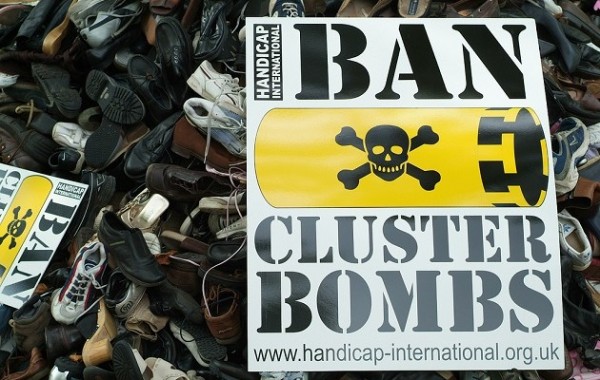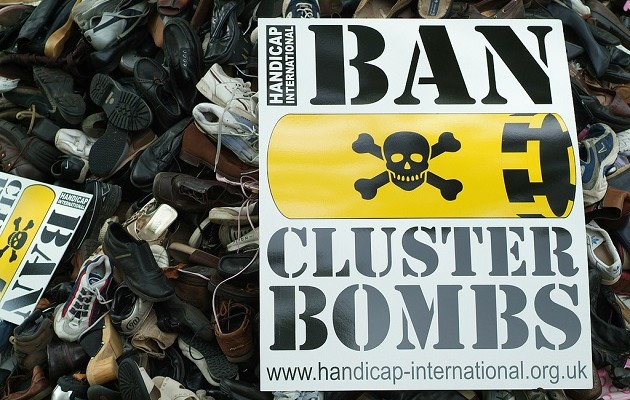 Last week, former NSA and CIA Director Michael Hayden told MSNBC’s Morning Joe panel that Americans “are not tolerant enough of collateral damage.” Hayden feels the American War Machine is too constrained by the conscience of ordinary Americans. His disgusting statement apparently does not apply to the Providence, Rhode Island-based Textron Corporation, who continue to manufacture and sell cluster munitions to other governments, who in turn use them indiscriminately in places like Yemen, Ukraine, Syria, and Sudan, to name a few.
Last week, former NSA and CIA Director Michael Hayden told MSNBC’s Morning Joe panel that Americans “are not tolerant enough of collateral damage.” Hayden feels the American War Machine is too constrained by the conscience of ordinary Americans. His disgusting statement apparently does not apply to the Providence, Rhode Island-based Textron Corporation, who continue to manufacture and sell cluster munitions to other governments, who in turn use them indiscriminately in places like Yemen, Ukraine, Syria, and Sudan, to name a few.
Despite the American government’s claims that they no longer use cluster bombs, hard evidence suggests otherwise. Yemeni journalist Haider Shaye found “irrefutable proof” that a 2009 missile strike in Yemen was conducted by Americans. The American strike came shortly after Barack Obama was awarded the Nobel Peace Prize. It killed 35 Yemeni women and children, and left behind at least one unexploded cluster bomb. Not long after Shaye reported on his findings, he was jailed by the Yemeni puppet regime and held past his anticipated release date at Barack Obama’s direct behest.
Even if the American military’s use of cluster bombs had gone undiscovered by Shaye, their complicity in other governments’ use of cluster bombs indicts them all the same. The Pentagon spoon-feeds overseas arms contracts to firms like Textron, who are equally culpable in the death and destruction.
When cluster bombs are dropped, they open mid-air, releasing many hundreds of smaller bombs which blanket large swaths of targeted territories. Because many of these “submunitions” do not detonate even after landing, they remain a danger to local populations where children often pick them up and farmers step on them or drive over them. Sometimes, the clusters lie dormant for years, even decades, before being stumbled upon by unsuspecting victims who have limbs blown off or are seriously crippled or disfigured. That is, assuming they are lucky enough to survive the blasts at all.
- Human Rights Watch condemns use of Textron-made cluster bomb
- Textron still makes cluster bombs despite downward global, US trends
- Textron sold cluster bombs to seven foreign governments
Even with the well-known minefield that is now Laos, where locals still fall victim to cluster bombs some forty years after America’s Vietnam War, Textron seems unable to pass up the lucrative arms deals. One of Textron’s justifications for the continued production and sale of cluster bombs is that their new and improved technology has become so refined that only a mere one percent or less of all cluster bombs deployed will remain unexploded. This “one percent rule” is in keeping with Pentagon requirements on cluster munition production, under which Textron appears to take moral cover.
Textron’s Vice President of Business Development Mark Rafferty called the advances in cluster bomb technology “extremely sophisticated” and added, “knowing that we are in no way, shape or form contributing to [civilian suffering] is really a very satisfying place to be.” Despite these protestations, it’s hard to imagine Rafferty would volunteer his own children to play minesweeper in places like Yemen, where the local population aren’t exactly reassured by Textron’s one-percent-unexploded estimate.
The hypocrisy of the American government on this issue is thick enough to cut with a knife. In 2011, Hilary Clinton admonished the now-deposed Libyan dictator Muammar Gaddafi for his use of cluster bombs while her own soldiers covertly dropped them in the Middle East. It was one of the many human rights violations that Clinton cited as support for her tunnel-brained rampage in Libya. Clinton also failed to mention that the United States, like Libya, is one of the few countries to refuse to sign onto the 2008 Convention on Cluster Munitions.
On April 18, 2016 the American Friends Service Committee (AFSC-SENE) will stage a 4:30 PM protest outside of Textron’s world headquarters in downtown Providence. While the profits are likely too good for Textron to pay any regard to the protesters, perhaps a hit to their stock price will help them see more clearly the carnage they cause beyond America’s borders. If investors are comfortable continuing to finance Textron’s deadly operations, they should be aware that they are inviting blowback against themselves and other innocent Americans.
This post originally appeared on the website of the Center for a Stateless Society, a “left market anarchist think tank and media center.” Chad Nelson is a Providence resident and a senior editor with the Center for a Stateless Society.

